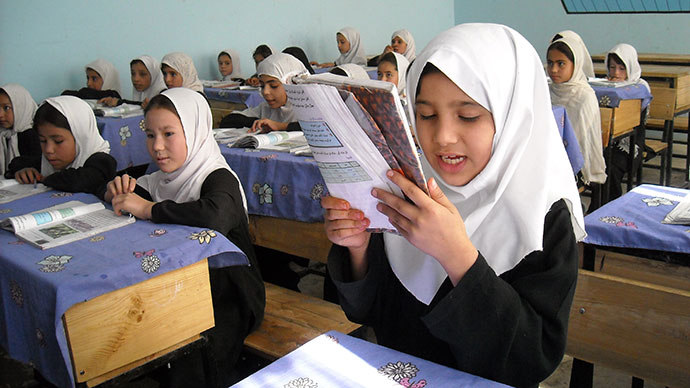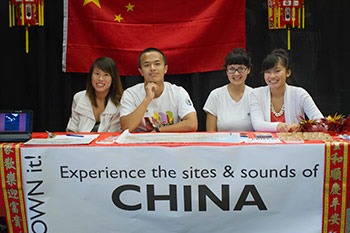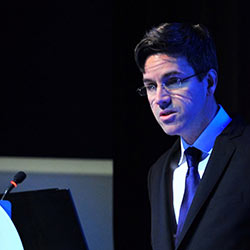Blog
Posted on March 2, 2015
By Kaitlin Marshall
International Women’s Day (IWD) began as a political movement in the United States and Europe. The first IWD was spearheaded by the Socialist Party of America and was celebrated in the U.S. on February 28, 1909. Over the years, the day evolved and gained global importance. Today, it is a national holiday in many countries and has been celebrated annually by the United Nations since 1975. This year, the theme of IWD is “Make it Happen,” which is meant to encourage effective action for recognizing and advancing women.

Photo Credit: Sahar
While much has changed in the 106 years since the first IWD, there is still an immense amount of work to be done. There are currently only ten women worldwide serving as heads of state and fifteen serving as heads of government. Women continue to participate in labor markets on an unequal basis with men. In 2013, the male employment-to-population ratio was 72.2 percent while the ratio for females was 47.1 percent. And, more than 700 million women alive today were married before their eighteenth birthday.
Continue Reading
Posted on February 23, 2015
By Kirsten Rogers, OneWorld Now!
 At the heart of international education is the goal of meaningfully engaging students in global issues, a daunting task when faced with the competing interests on high school students’ minds: SATs, college applications, after-school jobs and who to ask to homecoming. For well over a decade, Global Washington member OneWorld Now! has used world languages, experiential leadership workshops, and study abroad to bring the world to Seattle high-school students, draw their attention to global issues, and inspire them to take action for positive change. Below are a few tips and anecdotes to engage youth in global issues.
At the heart of international education is the goal of meaningfully engaging students in global issues, a daunting task when faced with the competing interests on high school students’ minds: SATs, college applications, after-school jobs and who to ask to homecoming. For well over a decade, Global Washington member OneWorld Now! has used world languages, experiential leadership workshops, and study abroad to bring the world to Seattle high-school students, draw their attention to global issues, and inspire them to take action for positive change. Below are a few tips and anecdotes to engage youth in global issues.
Continue Reading
Posted on February 10, 2015
Eighteen GlobalWA organizations selected for 2015 Global Philanthropy Guide
By Mauricio Vivero
 Trust matters, and when it breaks down, bad things happen. This plays out on many levels. We trust that police will protect, not harm, citizens. We trust our elected officials will act in our best interests. We trust that a coach will make the right call to lead our team to victory.
Trust matters, and when it breaks down, bad things happen. This plays out on many levels. We trust that police will protect, not harm, citizens. We trust our elected officials will act in our best interests. We trust that a coach will make the right call to lead our team to victory.
Trust is also critical in the world of philanthropy, especially when giving to causes and communities that are half a world away. Donors often cannot see the results of these investments firsthand, and the work happens in places that can be rife with corruption and political instability, where poverty is entrenched and its causes are complicated.
The world of global do-gooders is littered with high-profile flops, which further strains trust. Just last year, both Invisible Children, which created the wildly popular viral Kony 2012 video, and the Somaly Mam Foundation, named after the much-lauded campaigner against international sex trafficking, announced the end or radical downscaling of operations. These announcements followed very public criticisms of their claims and impact, and dramatic funding backlashes.
Continue Reading

 At the heart of international education is the goal of meaningfully engaging students in global issues, a daunting task when faced with the competing interests on high school students’ minds: SATs, college applications, after-school jobs and who to ask to homecoming. For well over a decade, Global Washington member OneWorld Now! has used world languages, experiential leadership workshops, and study abroad to bring the world to Seattle high-school students, draw their attention to global issues, and inspire them to take action for positive change. Below are a few tips and anecdotes to engage youth in global issues.
At the heart of international education is the goal of meaningfully engaging students in global issues, a daunting task when faced with the competing interests on high school students’ minds: SATs, college applications, after-school jobs and who to ask to homecoming. For well over a decade, Global Washington member OneWorld Now! has used world languages, experiential leadership workshops, and study abroad to bring the world to Seattle high-school students, draw their attention to global issues, and inspire them to take action for positive change. Below are a few tips and anecdotes to engage youth in global issues. Trust matters, and when it breaks down, bad things happen. This plays out on many levels. We trust that police will protect, not harm, citizens. We trust our elected officials will act in our best interests. We trust that a coach will make the right call to lead our team to victory.
Trust matters, and when it breaks down, bad things happen. This plays out on many levels. We trust that police will protect, not harm, citizens. We trust our elected officials will act in our best interests. We trust that a coach will make the right call to lead our team to victory.